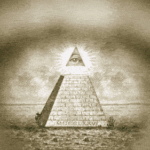The question “who started the Illuminati” has piqued the curiosity of historians, conspiracy theorists, and the general public for centuries. The Illuminati is often portrayed as a secretive group pulling the strings behind world events. But who exactly founded this mysterious organization, and what were their original goals? In this article, we will explore the origins of the Illuminati, debunk common myths, and shed light on the real story behind this enigmatic group.
The Origins of the Illuminati
The Illuminati was founded on May 1, 1776, in Ingolstadt, Bavaria (now part of Germany). The man behind this secret society was Adam Weishaupt, a professor of canon law and practical philosophy at the University of Ingolstadt. Weishaupt, disillusioned with the influence of religious and political institutions, sought to create an organization that promoted enlightenment ideals, reason, and the separation of church and state.

Why Did Adam Weishaupt Start the Illuminati?
Understanding who started the Illuminati also involves exploring why Adam Weishaupt established this group. Weishaupt was influenced by the Enlightenment, a cultural and intellectual movement emphasizing reason, science, and skepticism of traditional authority. He believed that the Illuminati could serve as a force for good, challenging the status quo and encouraging societal reforms. The society’s original goals included the promotion of rational thought, freedom of expression, and the reduction of religious influence in governance.
The Structure and Hierarchy of the Illuminati
To fully grasp who started the Illuminati, it’s essential to look at the society’s structure. The Illuminati had a strict hierarchical system, with several degrees of membership. This structure was designed to protect the identities of its members and ensure that only the most dedicated and loyal individuals rose to higher ranks. The society was initially small, with members recruited from Masonic lodges, as Weishaupt himself was a Freemason.
The Demise and Legacy of the Illuminati
Despite its ambitious goals, the Illuminati faced significant challenges from the outset. By 1785, just nine years after its founding, the Bavarian government banned the society and ordered its dissolution. Many of its members were arrested, and the group’s activities ceased. The official reason for the ban was the perceived threat the Illuminati posed to the state’s religious and political order.
However, the question of who started the Illuminati continues to intrigue people, mainly because of the myths and conspiracy theories that arose after the group’s dissolution. While the Illuminati was short-lived, it left a lasting legacy, inspiring countless books, films, and theories about secret societies manipulating world events.
Common Myths and Conspiracies About the Illuminati
The intrigue surrounding who started the Illuminati has led to numerous myths and conspiracies. One popular myth is that the Illuminati still exists today and controls global affairs from the shadows. Another common belief is that the Illuminati was responsible for major historical events, such as the French Revolution or the founding of the United States. These theories often portray the Illuminati as a nefarious group seeking world domination.
In reality, there is no concrete evidence to support these claims. The original Illuminati, founded by Adam Weishaupt, was a small group focused on promoting enlightenment ideals. The idea that the Illuminati continues to operate secretly is more fiction than fact, fueled by speculation and sensationalism.
The Real Influence of the Illuminati
While it is tempting to get lost in the sensational stories about who started the Illuminati and what they allegedly did, it’s important to separate fact from fiction. The real influence of the Illuminati lies in its role as a symbol of the Enlightenment. The society represented a push for intellectual freedom and skepticism of authority, values that continue to resonate in modern times.
The fascination with the Illuminati can be attributed to its mysterious nature and the allure of secret knowledge. However, the true story of the Illuminati is less about shadowy conspiracies and more about the pursuit of knowledge and rational thought.
Conclusion: The Enduring Fascination with the Illuminati
The question of who started the Illuminati may have a straightforward answer—Adam Weishaupt—but the myths and legends surrounding the group have taken on a life of their own. Despite being disbanded over two centuries ago, the Illuminati continues to capture the imagination of people worldwide. Whether viewed as a force for enlightenment or a shadowy puppet master, the Illuminati remains an enduring part of popular culture.








